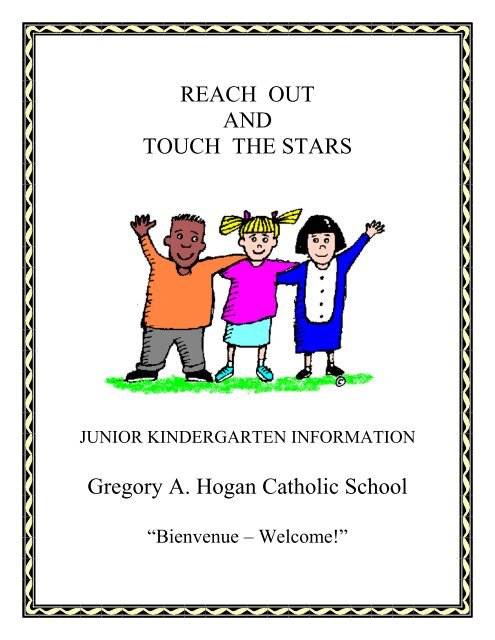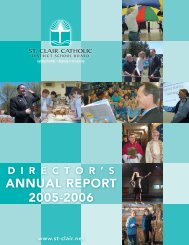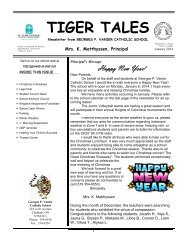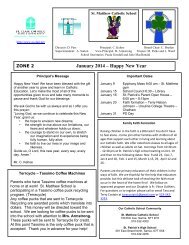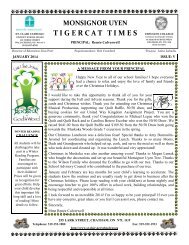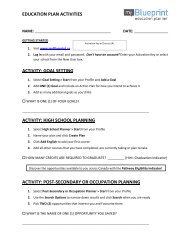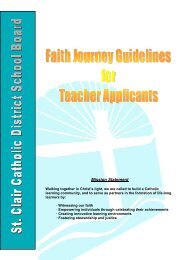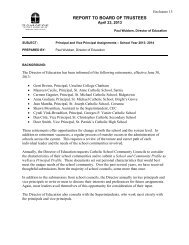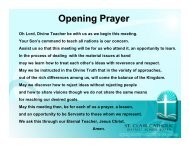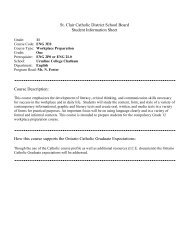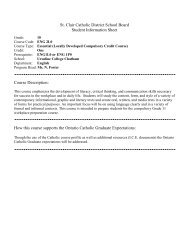Junior Kindergarten Parent Information
Junior Kindergarten Parent Information
Junior Kindergarten Parent Information
Create successful ePaper yourself
Turn your PDF publications into a flip-book with our unique Google optimized e-Paper software.
REACH OUT<br />
AND<br />
TOUCH THE STARS<br />
JUNIOR KINDERGARTEN INFORMATION<br />
Gregory A. Hogan Catholic School<br />
“Bienvenue – Welcome!”
General <strong>Information</strong><br />
and<br />
Admission Procedures
Dear <strong>Parent</strong>s,<br />
Welcome to the world of <strong>Junior</strong> <strong>Kindergarten</strong>! This year will be filled with many new and exciting<br />
experiences for your child. Our Program includes activities such as circle time, gym, story time, painting,<br />
and many others. The following information will help us to carry out these activities smoothly.<br />
1. School Times: School begins at 8:45 am. PLEASE NOTE: Please do not drop off children<br />
before 8:30 a.m. as there is no supervision. The school day ends at 3:15 pm. We ask that<br />
unless you have an appointment, please do not come too early to pick up your child as this<br />
can be distracting to the class. Please make arrangements to pick up your child on time.<br />
2. Lunch: Please provide a nutritious meal for your child every day. If you are concerned that<br />
they may get hungry, please send an extra granola bar, crackers and cheese or some other<br />
nutritional snack that they may eat after their sandwich has been completed. The J.K. children<br />
go out in their own little fenced area with the rest of the school during all recess times. We<br />
cannot leave anyone in the classroom during these times, because they would be<br />
unsupervised. If you feel your child should stay in due to a cold, etc. please keep them home<br />
to recuperate fully.<br />
3. Snack Time: Our school is NUT safe. Due to children with allergies in the classroom we<br />
prefer all food items to be nut free. The students will have two snack times a day. Children<br />
are encouraged to bring nutritious snacks for our breaks. Please ensure that at least one of<br />
these snacks is a nutritional snack such as carrot sticks, celery, apple, raisins, orange (already<br />
peeled or cut.) etc.<br />
4. Clothing: Please dress your child appropriately for the weather. We are outside at lunch and<br />
recess. Remember casual, simple clothing is preferred for active play and messy crafts.<br />
Please label all your child’s clothing and belongings clearly. When purchasing items for<br />
school (i.e. backpacks, lunch pails, coats, sweaters, shoes, etc.) please keep in mind your<br />
child’s abilities to dress independently. Your child is expected to dress and undress<br />
him/herself in the washroom and we will work on getting dressed independently. Please make<br />
sure that the backpack is a good-sized, child-friendly one that will fit all their accessories<br />
(lunch pail, etc.)<br />
5. Accidents–Extra Clothing: Even the best trained children can have toilet accidents. Students<br />
can also have accidents in the school yard where they fall into mud puddles. An extra pair of<br />
underwear, socks, shirt and pants with your child’s name on it could save you an extra trip to<br />
the school. Their extra clothing will be kept in the coat room in a container above their hook.<br />
6. Shoes: Running shoes are necessary for the gymnasium and practical for the classroom. We<br />
strongly discourage dress shoes as they can be very unsafe on our tile floors. Slip-ons or<br />
Velcro are recommended rather than high top or lace up shoes to aid your child in his/her<br />
ability to dress independently. We would also request that your child has two pair of shoes<br />
(indoor and outdoor shoes). Since the indoor shoes remain at school all year, be sure to buy<br />
an ample size and label clearly as other children may purchase similar shoes. Shoes will be<br />
stored in the coat room. No dark-soled shoes are allowed in the gym as they mark the gym<br />
floor. It is mandatory that students have footwear due to fire marshal regulations. NOTE: if<br />
you are unable to provide a second pair of shoes, please notify the office. We will be happy<br />
to assist you.<br />
7. Absence: If your child will NOT be attending school for any reason, please send a note<br />
and/or notify the school’s secretary by phone (519-542-8190). If someone other than yourself<br />
(the parent) is picking up your child, please notify the teacher by note or phone. This<br />
procedure is very important for your child’s safety. Also for your child’s safety, please<br />
reinforce that play dates with the other children can only be arranged through parents at home.
8. Notes: If you are sending a note to your child’s teacher in the morning, please place it in the<br />
“sac en plastique” (Ziploc bag). Otherwise, we may not get it or get it too late. Please check<br />
your child’s backpack for the “sac en plastique” which contains school newsletters. For any<br />
notes, money, etc. that you do send to school, please send in a sealed envelope with your<br />
family name clearly written on the outside and place in the Ziploc bag.<br />
9. Emergencies: It is very important that we have the name and number of someone reliable<br />
and with transportation available to them for emergencies. Please contact the school if there<br />
are any changes to be made to the student information sheet.<br />
10. Evaluation: <strong>Junior</strong> <strong>Kindergarten</strong> evaluation is an ongoing process through the use of an<br />
observational checklist. You will be invited to the school to observe your child and receive<br />
their progress report in November. Your child will also receive two report cards at the same<br />
time as the rest of the school in February and June. This information will be relayed to you<br />
in conjunction with the reporting schedule of the rest of the school.<br />
Thank you very much for your kind consideration of these matters. It is important that we make your<br />
child’s transition to school as easy and uncomplicated as possible. If there are any questions that you have<br />
or something that we should know about your child, please call the school at 542-8190.<br />
Sincerely,<br />
Gregory A. Hogan <strong>Junior</strong> <strong>Kindergarten</strong> Teachers<br />
GENERAL INFORMATION AND ADMISSION PROCEDURES<br />
Interview Process<br />
In order to make a smooth transition into the formal school setting your input and knowledge regarding the<br />
growth of your child from birth until entry into school is very valuable to us.<br />
The “Developmental History” questionnaire allows you to share your child’s social, educational, physical<br />
and medical history. Its aim is to bring together home and school in complete communication so as to<br />
ensure that your child will have his/her needs met thus assisting in maximum growth for your child<br />
throughout the year. You will receive your questionnaire by mail at the end of June. (Please call the school<br />
if your address has changed since registration) Please complete the questionnaire and bring it with you<br />
when you come for your scheduled interview with your child’s teacher in September.<br />
Interview time, your child’s designated school day and start date will accompany your questionnaire.<br />
Please mark your calendar with the date and time of your interview and bring your completed questionnaire<br />
with you on that day. It is not necessary for both parents to attend the interview but sometimes different<br />
perspectives can be worthwhile. If possible, please make other arrangements for your child’s care during<br />
the interview so that we can speak frankly and without distraction.<br />
When you arrive at the school for your interview please refer to the list posted outside the school office to<br />
find your child’s teacher and room number for your interview.<br />
Special Needs<br />
Each child enters school with different experiences, backgrounds and capabilities and as teachers and<br />
parents it is important that we are sensitive to these individual differences so that we can help the child<br />
develop to his/her optimum level. Knowing what skills your child has and those yet to develop will allow<br />
us to provide programming where your child will encounter success and develop feelings of mastery. The<br />
information received about your child’s development is strictly confidential. Early Identification of your<br />
child’s learning needs will lead to counseling in regards to the appropriateness of the French Immersion<br />
program verses access to special education resource help from your child’s home school.
Making<br />
the<br />
First<br />
Day<br />
Great!
Making the First Day GREAT!<br />
Looking forward to school is the first step towards a successful day. Talk about it in an excited way so<br />
your child will think of it as a happy experience. Discuss school activities, friends, and new things to learn.<br />
Your child may also have some mixed feelings. He/she may feel worried that their teacher won’t know<br />
their name or that they won’t know the children in their class. But, your child very likely also views the<br />
start of school and their new independence as an adventure, especially if they know what to expect.<br />
If your child expresses doubts or fears, don’t pass them off. Try to answer all their questions in a positive,<br />
reassuring way and let your child know that there will be friendly people to greet and help them.<br />
Before the First Day<br />
A “dress rehearsal” can make a big difference in making your son/daughter feel more comfortable by<br />
knowing what to expect.<br />
In the weeks leading up to the first day, practice walking to school or to the bus stop often so it becomes a<br />
familiar routine. If your child will be riding the bus, go over the safety rules a few times.<br />
If possible, visit the school building with your child so he/she knows what to expect. Show your child the<br />
school grounds and use the teacher’s name when you’re talking about school so he/she becomes familiar<br />
with them.<br />
Get everything ready a day or two in advance. Let your child pick out what he’s going to wear on the first<br />
day. If there are new clothes and shoes, let him/her “break them in” so they’re comfortable.<br />
A few days before, begin getting your child and yourself used to the school bedtime and wake-up schedule.<br />
Try to get everyone to bed a bit early the night before school starts.<br />
Dressing for Success<br />
Appropriate clothing also helps make learning fun. Here are some tips on how you can help your child<br />
“dress for success”.<br />
<br />
<br />
<br />
<br />
<br />
The children will be doing all sorts of active learning (including sitting on the floor, jumping,<br />
running, walking, bouncing, stretching, crouching, bending and sitting in a chair). Choose clothes<br />
that are comfortable and appropriate for all these activities.<br />
Some <strong>Junior</strong> <strong>Kindergarten</strong> activities involve outdoor play. Your child should have adequate<br />
outerwear for all types of weather.<br />
Choose clothes, jackets, shoes and boots that are easy to put on, take off and do up by themselves.<br />
Choose clothes that are durable and easy to clean. Learning can be messy when it involves<br />
painting, sand, water, outdoor play, etc.<br />
Help us by printing your child’s name on all clothing. It’s a good idea to write his/her name on all<br />
possessions that are taken to school (shoes, lunch box, school bag, etc.) to help prevent losing<br />
them.<br />
The First Day<br />
Get your child up early enough to eat a calm, unhurried breakfast. Try to keep things as normal as possible.<br />
For example, if your child normally has cereal for breakfast, make your child cereal this morning.<br />
When you say good-bye on the first day, make it quick, light and reassuring. They will be reassured by a<br />
warm hug and a reminder that you – or the usual caregiver – will be picking him/her up or waiting at home<br />
when he/she returns. Try not to communicate any feelings of anxiety or separation that you may have.<br />
This is going to be a fun day!
At School<br />
Fostering positive relationships is critical to the success of our students. We encourage parents to get<br />
involved in your child’s school by:<br />
<br />
<br />
<br />
<br />
<br />
<br />
<br />
Sharing information about your child with the school<br />
Contacting the teacher with questions or concerns<br />
Volunteering in the classroom<br />
Accompanying the class on field trips<br />
Meeting with your child’s teacher to discuss her/his progress<br />
Joining the School <strong>Parent</strong> Council at your school<br />
Serving on the School <strong>Parent</strong> Council<br />
You can Prepare Yourself Too<br />
If you feel comfortable with the first day, chances are your child will as well. You can prepare yourself by:<br />
<br />
<br />
<br />
<br />
<br />
Learning the names of the faculty who will be working with him<br />
Knowing the names of the principal, secretary and having the school phone number readily<br />
available<br />
Learning the school rules regarding behaviour, safety precautions, clothing, money, supplies,<br />
arrival/departure times, etc.<br />
Knowing the school calendar- which days your child will be attending school, and know on which<br />
days special activities (assemblies, school masses) will be occurring<br />
If your child rides the school bus, know the school bus zone number and where the school bus<br />
pick up point is<br />
After the <strong>Junior</strong> kindergarten day<br />
Talking with children about their experiences in French Immersion <strong>Junior</strong> <strong>Kindergarten</strong> sounds easier than<br />
it is! The question, “What did you learn in school today?” often receives the response, “Nothing. All we did<br />
was play!”<br />
These are some alternative questions that might help your child share more specific information with you:<br />
• What new French word did you learn today?<br />
• How did you make that?<br />
• What are you learning about now?<br />
• What learning centres did you go to today?<br />
• What was in the sand table today?<br />
• Can you tell me about the story you heard today?<br />
• Where did you play today?<br />
• Who did you play with today?
<strong>Parent</strong><br />
Resources and Tips
Supporting your child at home<br />
Things you can do at home to support your child’s French language learning<br />
include some French in your everyday home life, for example, watching a French program<br />
on television, a video, attending a cultural event in French or listening to a tape of French<br />
songs. (You’ll learn some French too, and the whole family will have fun!)<br />
review the French vocabulary of the week or month with your child<br />
listen to, repeat, recite, sing along with your child as he shares his latest French song,<br />
rhyme or story.<br />
Things you can do at home to encourage your child to be more self-sufficient<br />
encourage your child to make decisions by offering him choices<br />
encourage your child to take responsibility for some tasks<br />
provide opportunities for your child to practise buttoning, doing zippers, drawing, cutting, blowing<br />
nose and tying shoelaces<br />
Things you can do at home to promote your child’s good health to be more self-sufficient<br />
ensure plenty of rest, with early bedtimes<br />
ensure that your child eats a variety of nutritious foods from all the food groups<br />
encourage your child to walk, stretch, hop, jump, run dance or skip, both indoors and<br />
outdoors<br />
Include your child in everyday activities to practise new skills and explore new concepts<br />
baking—have your child help to measure ingredients<br />
walking—encourage your child to observe his environment and to develop an active<br />
lifestyle<br />
shopping—point out the names of stores, gas stations, businesses, restaurants and<br />
schools; notice traffic signs<br />
gardening—give the child a small section to plant and care for<br />
writing—include a note from your child in letters to family; have the child write telephone<br />
messages and lists<br />
cleaning and tidying up—help the child sort toys into categories: cars, blocks, dishes,<br />
puzzles.<br />
What Else Could I Do At Home?<br />
Read, read and read some more!<br />
Discuss the pictures and the story after you have read.<br />
Track the print—left to right—top to bottom.<br />
Provide a good role model. Read and write at home yourself.<br />
Teach your child rhymes, emphasizing similarities and differences in sounds.<br />
Model proper speech.<br />
Count with your child.<br />
Make sets with the numbers from 1 to 5.<br />
Help your child print his/her name.<br />
Make patterns with construction paper, beads etc.<br />
Play with the alphabet letter tiles, magnetic letters etc.<br />
Build alphabet trains together.<br />
Play with puzzles.<br />
Encourage your child’s successes.<br />
Sing Songs
Tips For Reading Adapted from “Yes, You Can Help”.<br />
The most important foundation for reading is established before your child goes to school. There is nothing<br />
more important that you can do for your child than to establish a love of books and an appreciation of the<br />
written word.<br />
Expose your child to English and French reading material as often as possible. Use a variety of genres (i.e.<br />
newspapers, comic books, fiction, and non-fiction). Discuss content with your child and encourage verbal<br />
feedback. Model reading to show that books can be a form of entertainment as well as a source of<br />
information.<br />
Libraries and Book Clubs are an excellent source for obtaining quality reading material. <strong>Parent</strong>s can assist<br />
their child in learning how to locate information and resources which will support his/her learning.<br />
There are several differences between French and English pronunciation that might be most obvious as you<br />
read along with your child:<br />
• consonants are essentially the same;<br />
• there are significant differences between the sounds of the vowels;<br />
• h is always silent in French;<br />
• an s at the end of a word, to indicate the plural, is silent;<br />
• qu sounds like k (not kw as quiet);<br />
• th is pronounced t;<br />
• ch is pronounced like the English sh;<br />
• i is pronounced like the long English e (see);<br />
• ou in French always sounds like troop (not out);<br />
• oi sounds like wa in wash;<br />
• au and eau have the long o sound (go);<br />
• ez has the long a sound (say);<br />
• accents change the sounds of vowels;<br />
< è sounds like the short English e (peck) ;<br />
< é sounds like the long a sound (say);<br />
< ê sounds like the short English e (peck);<br />
< ç sounds like the s sound (sand);<br />
• stress falls on the last sounded syllable (tapi sounds like tap-ee);<br />
• when a word begins with a vowel (or a silent h), it is usually joined with the last consonant of the<br />
preceding word – it will sound as though your child is reading one word instead of two.<br />
MUSIC<br />
RESOURCES<br />
Musician Age Description<br />
Charlotte Diamond 3 - 10 Seasonal and thematic songs available on cassette through Tralco.<br />
Étienne 10 - 14 Rock and roll style music includes themes and grammar structures studied<br />
in the classroom. Music available through Tralco.<br />
Jacquot 5 - 10 A variety of cassettes which explore thematic vocabulary through music<br />
available through Tralco.<br />
Sara Jordan 7 – 12 A series of songs focusing on grammar structures presented in a rap or<br />
rock and roll style. Available through Tralco.<br />
Gregg LeRock 10 – 15 A series of songs presented in a rock and roll style. Available through<br />
Tralco.<br />
Matt Maxwell 8 – 12 Contemporary music available through Tralco.<br />
Suzanne Pinel 3 – 10 Themes include: seasonal songs, popular children’s songs, and song and<br />
dance. A series of cassettes are available through Centre Franco-Ontarien<br />
de resources pédagogiques.
Software<br />
<strong>Information</strong>al technology can open up a whole new world to French as a Second Language students. Over<br />
the past few years, many new software titles have appeared on the market. They are designed for French as<br />
a Second Language students to provide information, to increase fluency levels, and to develop<br />
comprehension.<br />
There are numerous software programs and CD-ROMs available in French.<br />
Product Title Description Age<br />
ABCirque<br />
ABCirque is a set of eight educational games designed to help Primary<br />
children learn to read and count.<br />
Chantons à la ferme Students develop listening, reading, vocabulary study, writing, Primary<br />
singing, music reading, and music appreciation.<br />
Lapin Malin This product builds reading and thinking skills.<br />
Primary<br />
maternaelle 3<br />
Lapin Malin voyage This product builds reading and thinking skills.<br />
au pays de la lecture<br />
Le sac à mots Drill and practice, game, and exploration Primary<br />
Logimots<br />
This product builds reading and thinking skills.<br />
Primary<br />
(Scholastic)<br />
Millie, la maison des In six fun-filled activities, students explore fundamental math Primary<br />
maths<br />
concepts as they learn about numbers, shapes, patterns and<br />
sequencing.<br />
Quelle heure est-il? Drill and practice of time. Primary<br />
Sammy, la maison Sammy’s Science House builds important early science skills Primary<br />
des sciences<br />
and gives students the start they need to develop a positive<br />
attitude toward science and a curiosity about the world.<br />
Théo, Léo & Manda Activities to further develop students reading skills. Primary<br />
Mon premier French dictionary<br />
Primary/<strong>Junior</strong><br />
dictionnaire super<br />
genial<br />
Créateur <strong>Junior</strong> Students can create multimedia reports, animations, and slide Primary/<strong>Junior</strong><br />
Kidpix Studio Deluxe shows.<br />
Voyage au fond des Students practice basic math concepts (addition, subtraction, Primary/<strong>Junior</strong><br />
maths<br />
etc.)<br />
Auteur Studio deluxe This multimedia software allows students to create storybooks. <strong>Junior</strong><br />
Explorer le Canada This CD-ROM surveys Canada’s history, geography and <strong>Junior</strong>/Intermediate<br />
heritage.<br />
Hyperstudio Hyperstudio is a multimedia authoring system. <strong>Junior</strong>/Intermediate<br />
Excyclopédie de la<br />
nature<br />
This software allows students to watch the behaviour of animals<br />
in their natural habitat, and hear the calls of birds of prey.<br />
<strong>Junior</strong>/Intermediate/<br />
Senior<br />
Encyclopédie des<br />
animaux de la nature<br />
A full multimedia encyclopaedia of animals and nature. <strong>Junior</strong>/Intermediate/<br />
Senior<br />
Encyclopédie des Over 1700 entries organized in five categories: chemistry, <strong>Junior</strong>/Intermediate/<br />
sciences<br />
Math Trek<br />
Canadian Geographic<br />
Explorateur<br />
Zap-a-graph<br />
mathematics, physics, life sciences, and scientists.<br />
Math Trek is a multimedia program with sound, video,<br />
animation and graphics which is entertaining while providing<br />
guided instruction and practice on basic skills.<br />
This is an all Canadian geography-based multimedia program.<br />
It has its own built-in flight simulator that lets students create<br />
real-time flights over Canada.<br />
Zap-a-graph is a graphing program for teaching and learning<br />
high school mathematics.<br />
Senior<br />
Primary/<strong>Junior</strong>/<br />
Intermediate/Senior<br />
<strong>Junior</strong>/Intermediate/<br />
Senior<br />
Intermediate/Senior
Software is available from many different distributors. The following is a list of some distributors who<br />
carry French software:<br />
Le Club Harmonie<br />
542 Slingerland Court<br />
Newmarket, ON L3X 1X9<br />
Tel: 416-219-5405<br />
Fax: 905-830-4480<br />
PWEK<br />
967 Essa Cr.<br />
Pickering, ON L1W 2J2<br />
Tel: 905-831-9278<br />
Fax:905-420-7486<br />
Scholastic<br />
175 Hillmount Rd.<br />
Markham, ON L6C 1Z7<br />
Tel: 1-800-268-3848<br />
Fax: 1-800-387-4944<br />
Sources Of <strong>Information</strong><br />
• Alberta Education<br />
They have published a very helpful book for<br />
parents entitled Yes, You Can Help!<br />
Available for $9.95<br />
Tel: (780) 427-5775<br />
E-mail: www.lrdc.edc.gov.ab.ca<br />
• Alliance Française of Toronto<br />
Tel: (416) 922- 2014<br />
Special events and conversational French<br />
• Bayard Press Canada<br />
2924, boul. Taschereau, #201<br />
Greenfield Park QC J4V 3P1<br />
www.bayardpresse.com<br />
• Canadian <strong>Parent</strong>s for French - Canada www.cpf.ca<br />
An association of parents dedicated to the promotion and support of French as a second language<br />
instruction. It provides valuable resources and information and organizes events such as summer camps,<br />
conferences and book fairs. Among the useful resources published by CPF are the reference books: So you<br />
want your child to learn French!, More French, s’il vous plaît! and The State of French as a Second<br />
Language.<br />
• Canadian <strong>Parent</strong>s for French - Ontario (CPF) www.cpfont.on.ca<br />
176 Gloucester Street, Suite 310, Ottawa, ON K2P 0A6<br />
Tel: 1-800-667-0594 (416) 422-3554<br />
Fax:: (416) 422- 4669<br />
Or<br />
2055 Dundas St. East, Suite 103<br />
Mississauga, ON L4X 1M2<br />
Tel: 905-366-1012<br />
Fax: 905-625-5570<br />
1-800-6670594<br />
CPF’s National Website: www.cpf.ca<br />
• Centre Franco-Ontarien de Ressources Pédagogiques www.cforp.on.ca<br />
Librairie du Centre<br />
290, rue Dupuis, Vanier, ON K1L 1A2<br />
Tel: (613) 747-1553<br />
Fax: (613) 747-0866<br />
Wide selection of books, videos and software<br />
• Community Colleges<br />
Conversational French courses<br />
• Les Éditions Héritage Inc.<br />
25, boul. Taschereau, bureau 201<br />
Greenfield Park QC J4V 3P1<br />
Tel: 1-800-667-4444
• Librairie Champlain<br />
A French Bookstore<br />
468 Queen Street East, Toronto, ON M5A 1T7<br />
Tel: (416) 364 – 4345<br />
Wide selection of books, videos and software<br />
• La Librairie Française<br />
C.P. 299, 5617 8th Line<br />
Hillsburgh, ON., NOB 1ZO<br />
Tel: (519) 833 - 0328<br />
1-800-420-3003<br />
Fax: (519) 833 – 2242<br />
• Livres Mercier<br />
RR#2<br />
Tara, ON, NOH 2NO<br />
Tel: (519) 934 - 0262<br />
1-800-810-8045<br />
Fax: (519) 934 – 0262<br />
• Scholar’s Choice<br />
145 Kingston Road, E, Unit 11,<br />
Ajax, Ontario, L15 7J4<br />
Tel: (905)426-9224<br />
Limited selection of novels, tapes and<br />
workbooks.<br />
• Scholastic Canada Ltd.<br />
175 Hillmount Road<br />
Markham, Ontario<br />
L6C 1Z7<br />
Tel: 1-888-752-4690<br />
Fax: 1-800-387-4944<br />
Email: magazines@scholastic.ca<br />
• Tralco Educational Services Inc.<br />
1030 Upper James Street<br />
Suite 101<br />
Hamilton, Ontario<br />
L9C 6X6<br />
Tel: 1-888-487-2526<br />
Fax: 905-575-1783<br />
Website: www.tralco.com<br />
• Théâtre Français<br />
(416) 534-6604<br />
Plays in French
My Teacher Thinks I’m Special<br />
Written by Mary C. Howard<br />
My teacher thinks I’m special<br />
It comes as no surprise.<br />
She doesn’t have to say so.<br />
I see it in her eyes<br />
She tells me all about herself,<br />
Her family, friends, and dreams.<br />
That makes me feel important.<br />
She trusts me with those things.<br />
She says I have potential.<br />
She sees things others don’t.<br />
She sees those things that I WILL DO,<br />
And not the things I WON’T!<br />
She puts her hand on top of mine,<br />
And tells me, “Way to go!”<br />
“You can do it!” “Try again!”<br />
“I’m proud of you, you know!”<br />
It’s not my fault, it’s really not,<br />
There’s three ways to spell “TO”.<br />
With choices always facing me,<br />
I don’t know what to do.<br />
Sometimes I can’t spell anything,<br />
My fives are upside down.<br />
Two plus two makes three, I think,<br />
I turn “b” and “d” around.<br />
The rules all have exceptions.<br />
You can’t depend on those.<br />
The letters can say anything.<br />
What is that word – WHO KNOWS?<br />
I guess that when you’ve learned to read<br />
It’s easy to forget.<br />
It really is quite difficult<br />
When you haven’t learned how yet.<br />
My teacher tells me stories,<br />
Sets the words and pictures free.<br />
And while I’m learning how to read,<br />
She reads such tales to me.<br />
My teacher takes my hand in hers<br />
And guides me on the way.<br />
She knows I’ll read in my own time…<br />
Though maybe not today!<br />
My teacher thinks I’m special,<br />
Unique and very bright,<br />
A shining star in my own way<br />
Know what…I’M SURE SHE’S RIGHT!


